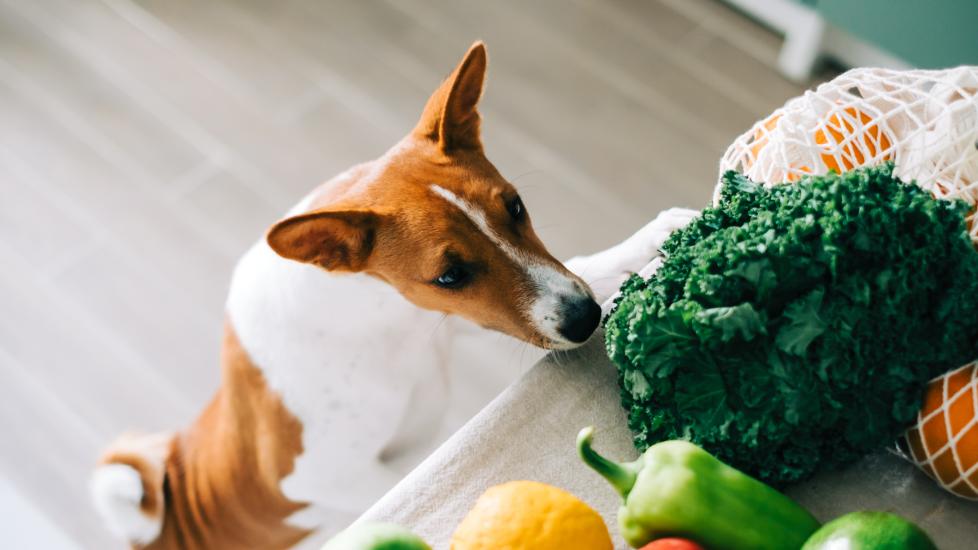Can a Dog Be Vegan?
What Is Veganism in Dogs?
The human vegan lifestyle is centered around not using animal products in any way.
Typically, this decision is made for an ethical reason, like having concerns with farming practices, environmental stability, or animal welfare. Pet parents may choose to buy vegan dog foods for the same reason.
Some individuals choose this lifestyle for their dogs simply because of perceived taste preferences or health benefits. In addition to avoiding meat-based dog foods, they also avoid dairy products and eggs. Vegan diets are often higher in fiber, vitamin C, and vitamin E.
However, non-animal sources for omega-3 fatty acids, calcium, vitamin D, and vitamin B12 can be hard to come by. For both humans and animals, improperly balanced vegan diets can have just as many health concerns as improperly balanced meat-based diets.
Why Dogs Go Vegan
There are limited health reasons why a veterinarian might recommend a vegan diet for your dog. Rarely, a meat-free diet (like Purina® HA) will be suggested because of a possible food allergy to a certain protein source.
True vegan diets (without any animal products) are difficult to balance nutritionally for the commercial pet food industry, and no studies have shown any health benefits from feeding this type of diet to dogs.
Most dogs eating a vegan diet do so because of their owner’s lifestyle choices. Because of this, veganism in dogs has caused significant controversy over whether feeding this type of diet is good for a pup.
Can a Dog Adopt a Vegan Diet?
Although they are part of the order Carnivora biologically, dogs are omnivorous (eating plants and meat) and not carnivorous.
Dogs have adapted to live with humans, making them capable of adjusting to a meat-free diet, unlike their wolf ancestors. Thus, while vegan diets are not healthier than other diets for most dogs, canines can still thrive with a vet-approved vegan meal plan.
Like human nutrition, the difficulty in safely adapting your dog to a vegan diet is making sure it’s well balanced.
It’s essential to have a board-certified veterinary nutritionist in the loop. They’ll help you plan and prepare the diet and make sure you are meeting your dog’s nutritional needs.
Commercial vegan diets are available, but not all of them are nutritionally complete. Making sure the diet is formulated to meet Association of American Feed Control Officials (AAFCO) standards is important. If the product has undergone feeding trials (where dogs are fed the diet and watched), it’s even better. Your vet can help advise you about these labels.
It may be tempting to feed a home-prepared vegan diet and have more control over what your dog eats, but these diets are often even more poorly balanced than commercial options.
If this is the route you would prefer, it’s essential to have a board-certified veterinary nutritionist in the loop. They’ll help you plan and prepare the diet and make sure you are meeting your dog’s nutritional needs.
Is It Safe To Make Your Dog Vegan?
To say that dogs depend on a meat-based diet is untrue. Dogs are even better at digesting carbohydrates than their wolf ancestors.
While they don’t have the gut bacteria to digest high-fiber plants like horses and other herbivores, they have lower protein and amino acid needs than true carnivores. They can also get vitamins like A and D from plant sources, just like us.
However, there are certain nutrients that are harder or impossible to get through a plant-based diet. Taurine and L-carnitine are essential amino acids that dogs can’t make themselves, and there are not enough of them in plant-based diets. Vitamin B12 and omega-3s are also much harder to get from common plant sources and are readily available in animal products.
To feed a vegan diet that meets your dog’s nutritional needs, these nutrients will have to be supplemented.
Supplements vary in how well they are digested and how well the products can be absorbed. Veterinary nutritionists have the education to help you choose supplements and diet components that have these nutrients and are digestible for your pup.
What if You're Vegan?
Vegan pet parents are faced with some obstacles when trying to stick to their lifestyle while keeping their omnivorous pets healthy.
If animal products are to be completely avoided, the best option is to seek out a veterinary nutritionist to help create a diet plan that fits the needs of your dog.
If a vegetarian diet is an option, Purina® and Royal Canin® offer some well-formulated choices. Sweet potato and peanut butter treats can replace rawhides.
Many dogs also love fresh veggies like carrots, peppers, and snap peas as treats!
For pescatarian pups who eat fish but no other meat, Purina®, Hill’s®, and Blue Buffalo™ also make great fish-based diets, which can be very helpful for itchy pets who need more omega-3 fatty acids.
Can a Dog Be Vegan? FAQs
Can dogs be vegan and healthy?
If the diet is properly formulated, balanced, and cooked, a dog can stick to a vegan diet without significant health issues. If you want to feed your dog a vegan diet, it is extremely important to work with a veterinary nutritionist to ensure that your dog’s needs are being met.
Featured Image: nikkimeel/iStock / Getty Images Plus via Getty Images
References
Axelsson E, Ratnakumar A, Arendt ML, et al. The genomic signature of dog domestication reveals adaptation to a starch-rich diet. Nature. 2013;495: 360–364.
